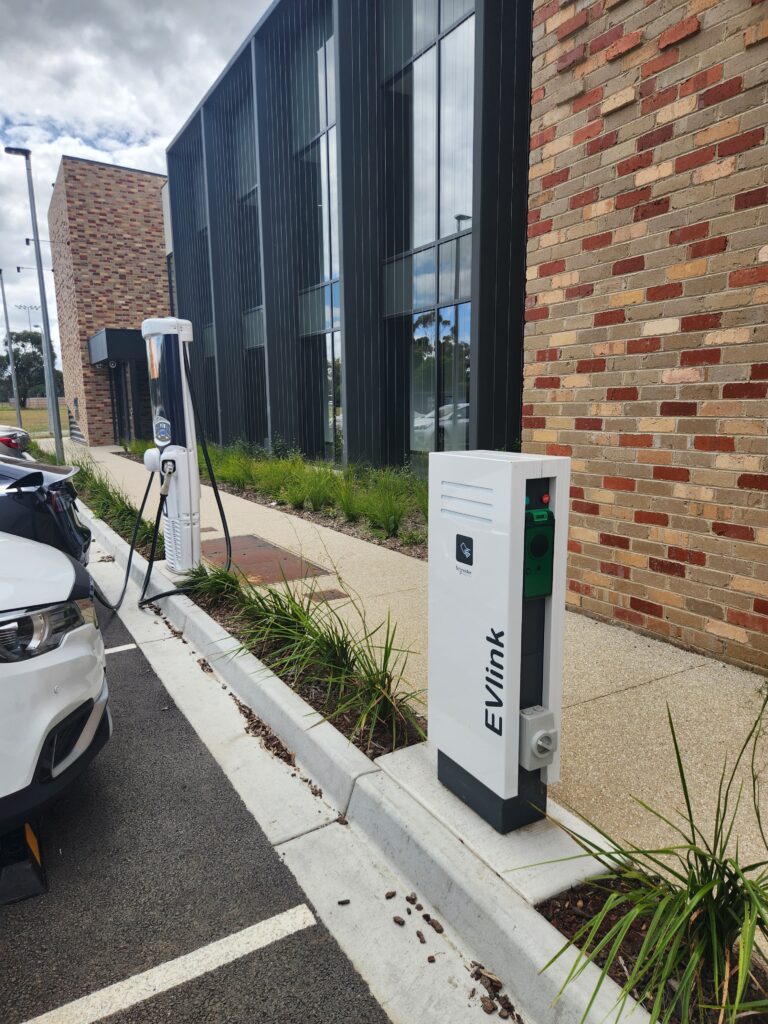EV lifestyle
How NSW Owner-Corporations Can Benefit from the EV-Ready Buildings Grant.
The NSW Government has recognised the need to invest in the future of electric vehicles (EVs). As part of their commitment to sustainability and innovation, they offer a generous grant to retrofit existing apartment buildings, making them EV-ready.
The application comes in 2 stages:
Stage 1 – Feasibility Assessment:
The grant will subsidize this assessment, with the applicant’s cost set at $2,000 ex-GST, while the NSW Government covers the rest of the fee.
Stage 2 – Infrastructure Upgrades
The grant co-funds 80% of eligible infrastructure costs, up to $80,000 per building at this stage. Additionally, it covers 50% of eligible software subscription costs for two years, up to $1,200 per building.
Selection criteria:
-The building must have private and/or common property visitor (or shared) off-street common property parking.
-No more than 4 EV chargers should already be installed.
-Confirmation that EV chargers will be appropriately operated and maintained.
-Proof of sufficient funds to complete the works.
Consider a few things
1. Apply sooner, if you need help, our team can assist you.🏃♂️
2. Invest in Quality Equipment. It’s easy to be lured by the allure of lower-priced options, but quality should be the top priority.
3. Enable payment options for users, the 20% investment can be quickly offset and increase the ROI. 💵
4. Sign a maintenance agreement with the installer to have your infrastructure in optimal condition.
5. Mid-Meter certified chargers. It allows the owner-corporation to accurately measure and bill residents for their individual EV charging usage.
6. Load Management System, it protects the entire electrical system to avoid any breaker trips by controlling chargers during peak time. 🏢⚡
Are you an owner-corporation or resident looking to make your building EV ready to charge your car? We’re here to help! 🚗💡
If you have enquiries about the EV Ready Buildings Grant, need guidance moving forward, or want to discuss how our services can benefit your property, don’t hesitate to reach out.
Feel free to drop us a message, comment below or send us an email.
info@beyondev.com.au
.
EV lifestyle
Do you want to start or expand your electric vehicle (EV) fleet? And you are concerned about the cost of setting up your in-house charging stations for your business? We have great news! Beyond EV has partnered with Australia’s leading asset financiers to help you install charging stations without worrying about the upfront cost.
Keep the cash in your business while saving big on refuelling and increasing the overall efficiency of your fleet. Start or Upscale in-house EV charging stations all without worrying about upfront costs!
Why: Fleets around the world are switching to EVs due to their low maintenance and fuel costs while contributing to a cleaner environment. In addition, many governments are legislating companies to switch to EVs and reporting their impact.
Benefits of Rent to Own charging station:
Be ahead of your competition while showing your customers your commitment to sustainability.
All repayments are tax deductible. Have complete control of your refuelling schedules.
Equipment maintenance included.
No upfront cost.
Offset installation costs.
Low repayments – Repayments may be lower than your current fuel cost.
Higher ROI.
Start your charging station project now or sooner!
How we do it:
We assess your sites thoroughly to understand to charging needs.
Get approved in less than 48 hours.
We carry out the installation, supply, commission and maintenance of your charging stations.
Peace of mind for your team
Book an appointment to assess your infrastructure.
or
Email us at info@beyondev.com.au
EV lifestyle
The transport industry is undergoing a monumental transformation, transitioning not only from internal combustion engines (ICE) to electric vehicles (EVs), but also advancing into the realm of intelligent vehicles. Electric vehicles are distinct from traditional ICE vehicles, necessitating a unique approach to meet their requirements.
In a world racing towards a more sustainable future, the transportation sector holds a pivotal role in shaping a cleaner society. EVs have emerged as the preferred choice for conscientious fleet operators committed to environmental well-being. Yet, the shift towards an all-electric fleet presents unprecedented challenges, with one of the foremost being the optimisation of charging schedules.
EV lifestyle
Fleets are crucial players in Australia’s push towards electrification and achieving net zero emissions. Fleet vehicles cover more km on average than household cars, making their transition to electric vehicles (EVs) a significant opportunity for carbon reduction and approximately 45% of all new cars purchased in Australia are owned by governments, businesses, or rental companies, underscoring the importance of prioritising fleet electrification efforts.
The Case for Fleet Electrification: Given their substantial share of new vehicle purchases, fleet electrification holds immense potential for driving the transition to clean transportation. To unlock these benefits, the industry should consider incentivising EV uptake with strategies such as bulk discounts for EV fleets, tailored monitoring solutions, and specialised tools designed specifically for fleet management. (more…)
EV lifestyle
In recent years, the world has witnessed a significant shift towards electric vehicles (EVs) as the preferred mode of transportation. As the demand for EVs continues to surge, so does the need for efficient and accessible home and fleet charging solutions. Recognising this growing requirement, the “Charging-as-a-Service” (CaaS) concept has emerged as a game-changer, revolutionising how we power our EVs in-house. This article explores the adoption of Charging-as-a-Service for home charging and its potential to accelerate the global transition to electric mobility.
The Need for Convenient In-House Charging: One of the critical factors driving the widespread adoption of EVs is the ability to charge them conveniently in-house. This type of charging offers the convenience of refuelling the vehicle overnight or while it is parked, providing a full charge for the next day and avoiding any operation disruption. However, installing a dedicated home charging station can be complex, expensive, and time-consuming, making it hard for fleet managers to support the transition to EVs financially. This is where Charging-as-a-Service steps in to bridge the gap.
EV lifestyle
Welcome to our blog post, where we delve into two significant challenges faced by EV charging stations that can erode the trust of the majority of users. In this article, we will explore connectivity issues and compatibility problems among different brands and manufacturers, highlighting the importance of overcoming these hurdles.
Connectivity problems, including issues with 4G, WiFi, or LAN connections, can significantly impact the performance of EV chargers, particularly when they are installed in locations with limited internet access, such as basements. EV chargers heavily rely on a stable internet connection to authenticate users and enable charging sessions. Interruptions in the internet connection can lead to immense difficulties and frustrations for owners, as well as added stress and expenses for operators. Although troubleshooting methods may vary across different brands, remote solutions are often preferred. However, without a reliable internet connection, resolving these issues becomes impossible. One common scenario is encountering an error at the start of a charging session, such as failing to scan an RFID card or unlock the car. These errors can disrupt the connection with the cloud, and the recommended approach is to return the charging guns to the charger and start the process again.
EV lifestyle
We will be discussing the rollout of electric vehicle (EV) charging infrastructure for Owners Corporations. We will delve into the significance of this development and highlight the various considerations and recommendations for implementing effective EV charging solutions.
Let’s begin by examining some compelling statistics. With over 16% of Australians residing in apartment buildings and an impressive 4% of new vehicles sold in Australia being EVs, the demand for EV charging infrastructure is poised to skyrocket. Recognising this need, the updated National Construction Code now incorporates minimum requirements for providing EV charging infrastructure within new developments.
To ensure the successful implementation of EV charging infrastructure, several key provisions must be considered. One such provision is the adoption of load management systems (LMS) (more…)
EV lifestyle
Welcome to this blog post, where we delve into the crucial topic of compatibility issues encountered during the installation of EV chargers. As electric vehicles continue to increase in apartment blocks, office buildings, warehouses, and depots, it becomes imperative to address the challenges associated with integrating chargers from different manufacturers. We will explore the significance of open protocols in enabling seamless communication among charging stations and their pivotal role in establishing smart load management systems (LMS) and Building Management Systems (BMS) for real-time monitoring and control.
EV lifestyle
In this blog post, we will discuss a critical yet often overlooked aspect of electric vehicle (EV) charging infrastructure – hardware maintenance. As we all know, EV charging infrastructure plays a vital role in enabling the widespread adoption of electric vehicles. However, regular hardware maintenance is imperative to ensure seamless operation and prevent costly malfunctions or replacements. In this article, we will explore the importance of maintenance and provide practical recommendations for maintaining different types of charging stations.
The Significance of Maintenance:
EV lifestyle
In this blog, We look into our latest installation project for a client transitioning towards complete fleet electrification. This endeavour is unique to me, as it is my favourite project so far. Witnessing our client embrace and utilise the charging stations almost immediately with utmost enthusiasm instils in me a profound sense of pride, knowing that we are making a significant contribution to reducing carbon emissions in the transport industry.
We aimed to expand the charging using the existing power supply. We rewired all the existing stations to allow the expansion of additional chargers. We achieved this by converting the current charging stations from 3 Phase to 1 Phase. You might wonder, “Isn’t 3-phase faster than 1-phase?” In theory, it may be, but in practice, it sometimes proves unnecessary.


